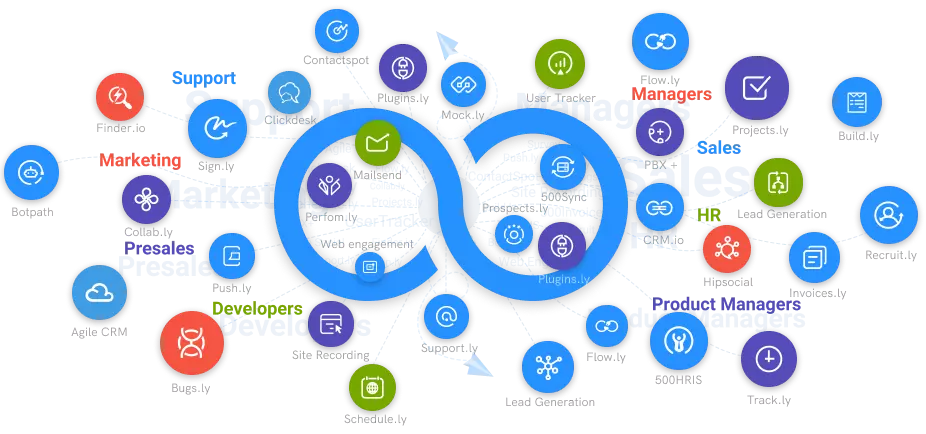Benefits of RPA Software
Implementing RPA into your business processes reap numerous benefits and helps get maximum producutivity.
#1
Automated Repetitive Tasks
#2
End-to-End Bot Development
#3
Customized Bot Builder
#4
Unlimited Automated Workflows Management
#5
Automated Data Extraction
#6
Workflows Recording Management
#7
Rule-based Process Automation
#8
Seamless Data Management
#9
Unbelievable pricing - the lowest you will ever find
#10
Everything your business needs - 50 apps, 24/5 support and 99.95% uptime
“The first rule of any technology used in a business is that automation applied to an efficient operation will magnify the efficiency.”
This quote by Bill Gates encapsulates the benefits that robotic process automation (RPA) can offer. RPA is a relatively new technology that is gaining a lot of traction these days. Benefits of RPA technology are such that it allows a software robot to automate repetitive, standardized, and mundane human tasks to free valuable resources to work on core business objectives.
RPA captures application data, executes transactions, and triggers responses. It can help businesses improve their scalability.
As per a recent report, almost 90% of companies are aiming to adopt RPA by 2020. Moreover, RPA budgets have increased by about 9% in the last 12 months.
If you are also thinking of investing in RPA but are on the fence about whether it's worth the investment then let's take a look at some of the key benefits of RPA. This will simplify your decision-making process.
Cost efficiency
Research shows that RPA is capable of reducing 25-50% operational costs for businesses by automating data-intensive and repetitive tasks. Since software robots are capable of working 24/7, companies can start seeing benefits of RPA in the form of visible gains by employing RPA tools.
Software tools also cost much less than hiring a full-time employee. Moreover, they offer a higher return on investment than a human resource with similar capabilities.
This makes the upfront costs for installing an RPA tool look like a bargain. This is why cost efficiency is one the key benefits of RPA.
Effective resource utilization
Yet another benefit of RPA is that it frees the human resources from doing tedious and low-value tasks, allowing you to utilize the human resources in performing high-value tasks. By fully utilizing the capabilities of a human resource in a higher-revenue generating task, you can make your business operations much more efficient.
Moreover, human resources are prone to boredom and silly mistakes when working on repetitive tasks. This can significantly increase the risk of errors and can hurt the business. RPA can help eliminate these risks associated with human errors and optimize the use of human resources.
Improved accuracy
Since RPA reduces the probability of human errors by automating business processes, therefore, one of the benefits of deploying RPA is improved accuracy. Software robots are usually more reliable than their human counterparts. They can work reliably and consistently without letting the output quality suffer.
Improved accuracy also helps reduce the cases of revisions or re-works. RPA tools are capable of delivering 100% accuracy which cannot be expected from human resources.
The elimination of costly mistakes also reduces instances of poor decision making. It ultimately leads to a better customer experience and improved brand perception, yet another benefit of RPA.
Scalability
A big benefit of utilizing RPA tools is that they can make your business easily scalable. Organizations can easily scale up or down their operations as per their need. They can also make an adjustment to business operations based on seasonality.
Instead of having to hire a dedicated team to meet the business requirements, companies can rely on RPA tools that are easy to install. This can be a big benefit of RPA for organizations that are dynamic by nature.
Improved analytics
Having accurate data from various sources will in turn improve the analytics capabilities of an organization. Since automated systems can be tracked easily with greater accuracy, the company can have better analytics.
Improved analytics
By tracking RPA systems, companies can increase the governance and planning, to improve workflow management. Even if the RPA becomes more complex, the benefits of RPA are such that the system will still be able to track its performance with complete authority.
Improved customer interactions
Since RPA systems are capable of processing a larger amount of data, they can be way more efficient than human staff. This can directly translate to better customer experiences and improved satisfaction levels among your customers.
RPA is capable of handling a majority of customer requests at an impressive speed. This ensures that customers have a better experience interacting with your business which leads to improved customer loyalty.
Another major benefit is that RPA frees up human resources so they can instead focus on interacting with high-value customers.
Consistency and non-invasiveness
RPA technology is non-invasive since it doesn't interfere with any existing systems and can be installed to support inherent systems. It does not require you to replace any existing IT systems and instead can complement the systems that are already in place. It can leverage the capabilities of your IT systems to give even more benefits of RPA.
RPA can help modern jobs become more fluid. It also offers perfect consistency in performing the designated processes across all the verticals without any irregularities.
Time saving
RPA can significantly reduce the time taken to perform a specific task. Instead of a few minutes that a human resource might take to complete a task, a software robot can do the same task in mere seconds.
This might not look notable but when multiplied over hundreds or even thousands of cycles, it can compound to a significant sum. Therefore, another benefit if RPA is that it adds up to remarkable time savings in the long-run. Automation can thus help to do a large amount of work in a relatively shorter period, enabling faster delivery.
Flexibility and versatility
RPA can perform a wide range of tasks and can be applicable across varied industries. It can be used to automate any rule-based repetitive tasks across any industry.
Moreover, since RPA does not require any coding, it means that even complex processes can be transferred from human to machine easily. The flexibility and versatility offered by RPA enable organizations to deliver quick returns.
Ease of installation
Implementing RPA in an enterprise does not require setting up an API. This makes the entire installation process hassle-free and cost-saving.
RPA has its own set of graphical user interfaces. These are easier to use and can be set up by anyone irrespective of their technical expertise.
Better control and visibility
A major benefit of implementing RPA is that most of the processes remain in-house. So, as opposed to outsourcing work to an external party, the company can retain the possession of critical business operations. This helps maintain control, visibility, and privacy of all the operations.
Employee satisfaction
Allocating the tedious and repetitive tasks to robots actually boosts the morale of employees. Since they no longer need to spend time on mundane tasks, employees get the freedom to put their focus on more critical operations. This leads to higher employee satisfaction.
Studies have shown employee satisfaction to increase when they get to perform meaningful and worthy tasks. It helps create an organizational culture where there are plenty of driven employees.
Another benefit of satisfied employees is that they don't feel the need to switch jobs.
Higher speed and increased output
Since software robots are capable of processing a large amount of data in a very short time, it increases the overall operational speeds. There are no instances of people fatigue or quality variance either. RPA thus empowers organizations to significantly increase their output while reducing the time taken to process customer requests.
Increased expertise
Since RPA allows companies to automate simple tasks, they can focus on developing expertise in their core domains. By putting human resources on core operations, a company can develop into a market leader in a particular domain.
Improved record-keeping
Robots always maintain a log file of all the interactions that they participate in. Accurate documentation helps businesses keep track of everything. It also helps companies recover data easily in case of unexpected shutdowns or outages.
Industry-specific benefits of RPA
RPA can have specific benefits for different industries –
Finance - The finance industry can make use of RPA to vet new suppliers with a full report on credit score, tax data, etc.
Healthcare - RPA bots can be used in healthcare to simplify patient appointment scheduling. These bots can also assess the data on diagnosis, location, doctor availability, etc.
Energy - RPA can help energy companies to improve customer experience and manage utility-related transactions efficiently. These bots can be used for validating meter readings and reducing human error.
Manufacturing - Manufacturing businesses can benefit from RPA in production, order fulfillment, or shipping processes on the production floor.
Education - In the education sector, RPA tools can be utilized in the enrollment process. It can be used to check application forms, validate documents, and even assess student eligibility. It can also extract students' grades from the database, fill relevant forms, and send reports to parents.
Government - Government agencies are also looking at employing RPA tools to reap the benefits of RPA such as to reduce backlogs, improve throughput, and optimize compliance. RPA can also help government agencies in processing a large number of documents.
Conclusion
RPA is revolutionizing process efficiencies across companies and changing the way businesses are run. It is likely that the organizations that adopt RPA will soon outpace those who still depend on human capital for all their processes.
Irrespective of which industry or business you are in, RPA can prove to be a valuable tool for you. The benefits of RPA highlighted above paint a bright picture of the applicability of RPA. McKinsey & Company even estimates that RPA systems could undertake close to 140 million jobs by the year 2025. This speaks plenty about the potential of RPA.
If you are also looking for an RPA tool then Botpath could be ideal for you. It is one of the multiple apps that we have developed for catering to various industries. To know more about Botpath, visit us at 500apps





